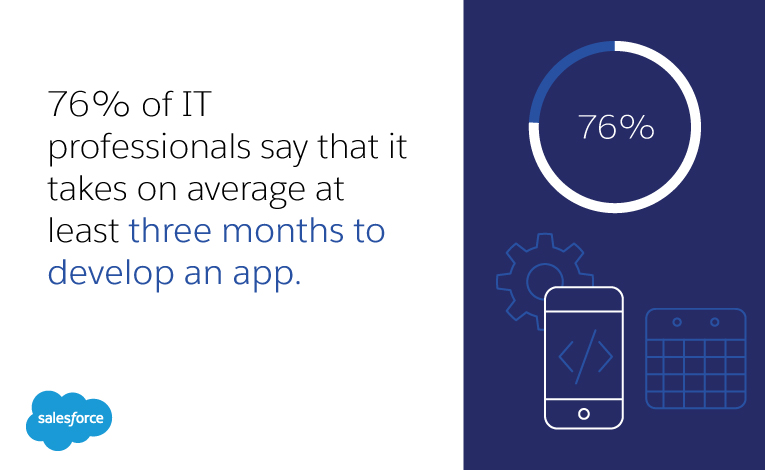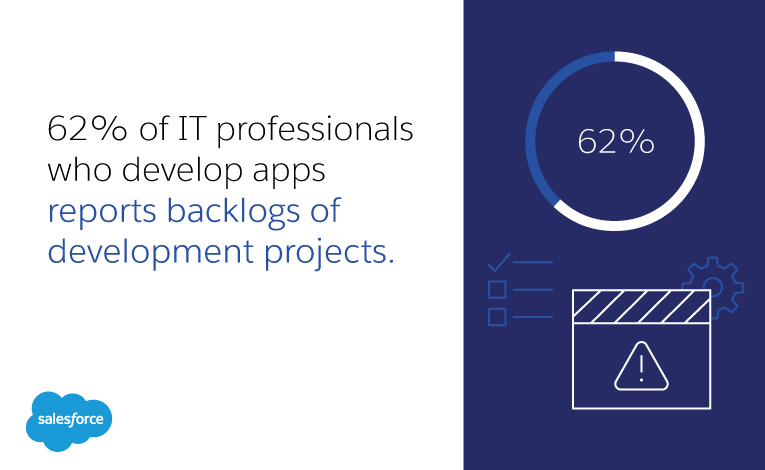The State of Enterprise Application Development: What's Hype and What's Not

What is enterprise application development?
Enterprise application development is evolving to become more agile and collaborative where IT works to build applications both with internal business teams and agencies external to the company — better understanding and incorporating the end user’s needs. This is primarily enabled by the rapid adoption of cloud technologies.
Historically, businesses would build the software they needed by taking advantage of large teams of in-house resources, using a lengthy, rigid waterfall process. This was primarily due to the limitations of the technology. On-premise approaches using Java, .Net, and other options kept the individual steps within application development lifecycle rigid and siloed, limiting collaboration and rapid iteration.

In addition, these applications were also often difficult and expensive to develop. 76% of IT professionals say that it takes on average at least three months to develop an app. IT needed to set up infrastructure, ensure uptime, availability, security and scalability for every application. This added to the burden of building and later maintaining applications.
On top of the issues related to development time, organizations were forced to deal with developer shortages. 37% of organization face a shortage of mobile developers and 44% identify a knowledge gap in the necessary development skills. As a result, in-house developers and IT departments are often unable to keep up with demand. 62% of IT professionals who develop apps reports backlogs of development projects.
In short, the traditional approach to building applications required a significant amount of time, expensive talent, and investment in infrastructure and tools. That approach is even less feasible with the new demands of the connected world. However, all of that is changing with the introduction of cloud platforms as a service.

High productivity cloud platforms eliminate the barriers to enterprise-level application development.
With the cloud, users can work with programs and services without having to worry about expensive or time-consuming hardware installation and infrastructure setup, nor do they need to deal with server security, uptime, and availability. On-premise app development solutions are quickly becoming a thing of the past. Cloud platforms allow for better communication and real-time collaboration between teams, and for businesses interested in enterprise mobile application development, it offers something more.
Cloud app development platforms are capable of doing most of the heavy lifting when it comes to creating customer apps. Built-in tools, APIs and data integration, security, user management, and even reusable UI components and templates — all help to resolve the challenges of enterprise application development. Now, even small- and medium-sized businesses can enjoy the same customised application solutions as enterprise-level companies, thanks to software development tool providers.
The three levels of the cloud — SaaS, PaaS, and IaaS help businesses move faster with apps. With SaaS, designed for end users and delivered directly over the web, along with PaaS which lets non-coders configure and build custom cloud apps using a simple model-driven approach, and IaaS which gives the developers a plethora of custom cloud services to build and run apps with minimal infrastructure setup effort, enterprises are supported through the entire process.
Now that that businesses are able to use cloud-based platforms rather than relying on heavy infrastructure, the question for IT departments isn’t “How can we design this app?” It’s “what type of cloud can offer us the best support while we design this app?” Finding the right app development cloud provider is an essential part of the development process, one that may easily set the tone for — and effectiveness of — app development projects for years to come.
These are the factors you should consider when choosing a platform for cloud application application development
Cloud-based enterprise application development companies generally share a number of characteristics, namely that they save users time and effort by providing tools that can be accessed without specific hardware requirements. In order to find a better fit for an enterprise’s application strategy, here are several factors to consider when selecting a cloud app development platform:
Faster application development tools
Speed is always a concern when creating business apps, which is why the tools themselves need to be capable of producing fast results. To accomplish this, the best app development tools offer a variety of time-saving features, such as easy visual prototyping, model-driven development of business logic, APIs to integrate apps with data, easy testing and analytics capabilities, direct deployment via web or mobile containers, and the options to use code, low code, or even no code development for all of the above.Security
Custom applications rely heavily on vital customer and company data. Of course, that data may also be very sensitive, and so should be protected at all costs. The best application development tools rely on effective, built-in security measures. Both network- and application-level security help to ensure that no weakness exist in either the app or the cloud for cyber criminals to target. Reliable password policies, permissions, multiple factor authentication, field- and row-level security, penetration testing, secure firewalls, HTTPS encryption, advanced threat detection, IP login restrictions, secure data centers, third party certifications, and backup and disaster recovery options all help ensure that your data is protected.Scalability
As businesses grow, they need tools that can grow along with them. Effective app development tools should be capable of scaling along with your business, so that you benefit as much from them tomorrow, as you do today. Development tools that can support massive streams of data — including internet of things (IoT) data — will be better suited to help your business grow, and tools that can be configured to your existing practices and processes will be able to remain viable as those processes change.Support for disruptive innovations
As new innovations come along, they have the tendency to disrupt the existing market. Superior enterprise application development tools include the ability to support these disruptive innovations, so that your business doesn’t end up getting left behind. Predictive intelligence, continuous DevOps, at-rest encryption key management, enhanced API management, and more can help ensure that disruptive innovations don’t disrupt your work. Likewise, having machine intelligence built directly into the tools allows users to build intelligent task automation into the applications they create.Ecosystem that accelerates innovation
Even with the right tools, creating a custom app from scratch takes time. As such, an enterprise application development platform designed with a reliable ecosystem of prebuilt components and apps natively developed by 3rd parties on the platform of your choice may make all of the difference. The right app ecosystem decreases the time and money spent on development, and ensures that your application is ready when you need it.
The Salesforce Platform leads the enterprise application development industry.
Salesforce, known as the most-trusted CRM provider in the world, has also created the world’s #1 cloud app development platform — the Salesforce Platform. The Salesforce Platform is the fastest path from idea to impact, enabling enterprises to transform their business with apps built around their customer. Designed to empower anyone to build apps with a meta-data platform, and backed by enormous capabilities for connectivity, automation, and intelligence, the Salesforce platform is used by thousands of businesses as a key part of their enterprise application development stack.
In this age of connected customers, new data is necessitating new approaches to enterprise app development. The Salesforce Platform gives you the power to design data-relevant applications that make a difference. Check out the Salesforce Platform ROI Calculator, and get ready to see for yourself just how effective custom apps can be.

